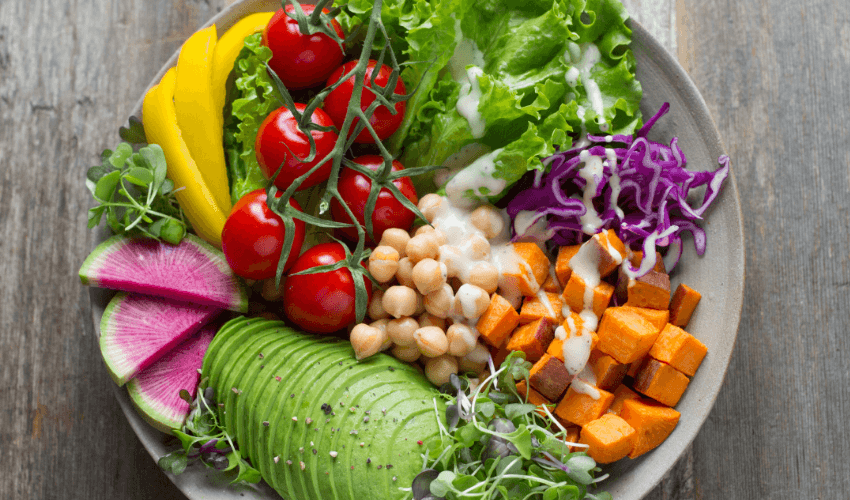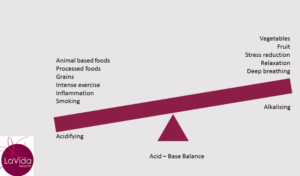You’ve probably seen the advertisements encouraging you to take a probiotic for good inner health. You may have even tried a probiotic supplement (perhaps with success or maybe not). And if you’ve ever looked at the number of different products available it would be no surprise if you have ended up very confused as to what, if anything, you should be taking.
So, let’s just get back to basics with a better understanding of how to support your good health through the use of prebiotics and probiotics.
I’ve written previously about the human microbiome and the important role it plays in our health. If you haven’t read that blog, it is a good place to start. But how do you create a healthy microbiome? You may be surprised to know it all began before you were born…..
A human is first ‘seeded’ with microbiota (bacteria and other microscopic organisms such as yeast and fungi) in utero, meaning your mum’s microbial environment was passed on to you while you were growing in her belly. Once you are born, it is thought your microbial diversity matures within the first 3 – 5 years of your life. At this time, it resembles more of an adult microbiome and remains relatively stable throughout your life.
So your underlying microbiome will be dependent on your mother’s diet before and during pregnancy, whether you were born vaginally or via a caesarean section, whether you were breastfed or formula fed, your exposure to antibiotics or other medications in those first few years of life and your genetic makeup. All these factors (as well as your diet and lifestyle) determine the unique combination of species and strains of microorganisms that make up your microbiome.
It’s difficult to go back in time and examine and change your mum’s diet and lifestyle before you were born, or change the way you entered the world, so how can you make sure your microbiome is balanced now? It all comes down to diet and lifestyle, and in particular, the consumption of prebiotic and probiotic foods.
What are prebiotics?
Prebiotics are a type of dietary fibre that resist digestion in the small intestine and as a result, ferment in the colon. The fermentation process breaks down the food to short chain fatty acids which keep your bowel healthy and helps those good microorganisms flourish (in effect providing the fuel they need to stay alive).
Prebiotics therefore help your microbiota thrive and proliferate to ensure the balance of good and bad bacteria, supporting your immune health, reducing inflammation in your bowel and also ensuring waste is being properly excreted.
Prebiotics can be found in a number of healthy foods such as:
- Garlic
- Onion
- Bananas
- Asparagus
- Leek
- Artichokes
- Zucchini
- Celery
- Linseeds (flaxseeds)
- Chickpeas
- Lentils
- Broccoli
- Cabbage
- Kiwifruit
- Prunes
- Wheat bran
What are probiotics?
Probiotics are live microorganisms present in certain foods. The probiotics you consume help to deploy the good microorganisms to your digestive system and have numerous health benefits. Probiotics can improve your gut health by assisting your microbiota to flourish, reducing intestinal inflammation and supporting normal intestinal barriers thereby improving immune function.
There are a variety of species and strains of probiotics that have health benefits. Two well-known and researched probiotics are Lactobacillus and Bifidobacterium. These are useful for conditions such as irritable bowel syndrome, inflammatory bowel disease and ulcerative colitis. Saccharomyces boulardii is a beneficial yeast useful in cases of diarrhoea and can be used as a preventative for ‘traveller’s diarrhoea’. Research is ongoing into the variety of species of probiotics and their health benefits (and exploring any negative effects for human gut health too) so no doubt other benefits to your health, beyond that of your gastrointestinal system, will be discovered in due course.
You can find probiotics in the following foods:
- Natural yoghurt
- Miso soup
- Tempeh
- Sauerkraut
- Green pickles
- Kefir
- Kombucha
- Kimchi
- Apple cider vinegar
A word of advice on adding in pre and probiotic foods
When adding prebiotic or probiotic food into your diet for the first time, I recommend you start with small amounts (even as small as 1/2 a teaspoon) and slowly build up to give your microbiome time to adapt to their new fuel source (think of it like fertilising the garden…you do a small amount often rather than a whole lot all at once). And even if you do start slow, some people may not tolerate these foods and experience bloating, flatulence, diarrhoea or constipation as a result of eating them. If this is you, it is best to seek the advice of your naturopath so the underlying cause of your issues can be identified, and an appropriate dietary plan can be implemented, specific to your needs.
Do you need prebiotic and/or probiotic supplements?
Prebiotic supplements generally include fructo-oligosaccarrhides and galacto-oligosaccarides which may be listed as; acacia gum, guar gum, apple pectin, arabinogalactans, slippery elm, inulin and psyllium. These all reach your colon for fermentation. Prebiotics are often beneficial when dietary intake of prebiotic foods is inadequate. They may help improve gastrointestinal complaints such as constipation or diarrhoea and to reduce irritation and inflammation in the bowel. Their health benefits reach beyond the gastrointestinal system and may support your immune system and overall well-being.
Probiotic supplements consist of a variety of species and strains of live microorganisms such as bacteria and yeast, and are beneficial particularly after a course of antibiotics or other medication, after a period of gastrointestinal illness, in cases of recurrent infection, in skin complaints such as eczema and psoriasis as well as other circumstances.
Not all probiotics are created equal however, and specific species and strains of bacteria have been researched for specific health complaints. For example; Lactobacillis rhammnosus GG is a particular strain of bacteria useful in preventing infantile eczema; and Bifidobacterium lactis HN019 may improve the frequency and consistency of bowel movements for those suffering constipation. Therefore, if you’re going to take a probiotic you want to ensure you’re taking one specific to your needs.
It is also important to choose a probiotic that has been proven to reach the colon and not be destroyed by stomach acid or digestive enzymes further up the digestive tract. There’s no use taking a good quality product if it doesn’t make it to the desired part of your gastrointestinal system to do its good work.
Like all supplements, I don’t believe there is a ‘one size fits all’ solution, and therefore, do not recommend taking supplements without having a clear understanding of how this will benefit your health. Therefore, always consult your naturopath to understand what supplements you need and why, how much you need to take, and when you should take it. That way you will get the most out of your supplements and your health.






1 thought on “Everything you need to know about prebiotics and probiotics”
Thanks for your feedback.